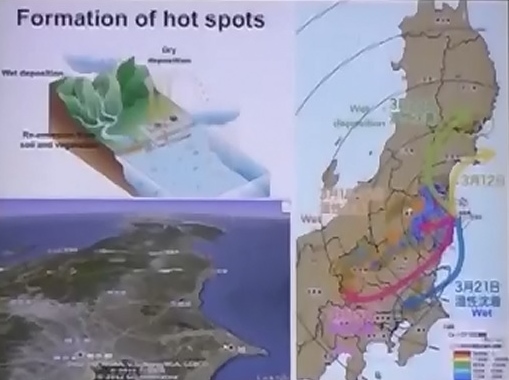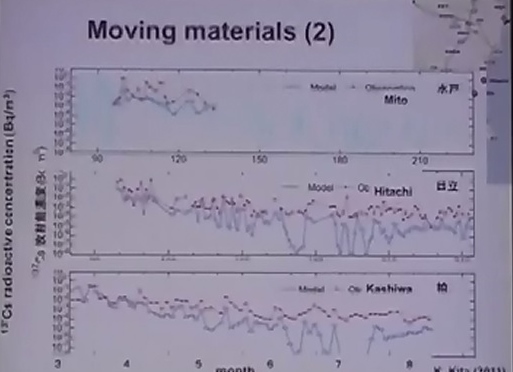http://www.asyura2.com/14/genpatu40/msg/818.html
| Tweet |

Watch: Nuclear experts confront Japanese scientists — IAEA says Fukushima reactors “might still be active” long after meltdowns — “Changes completely” our idea of what happened — “Very surprised… extremely high” Iodine-131 levels — Means fission reactions lasted for weeks or months (VIDEO)
注目:核専門家が日本の科学者と直面する−IAEA(国際原子力機関・International Atomic Energy Agency)は、福島の原子炉がメルトダウン後長く 「さらにアクティブであった(核分裂反応があった)可能性があります」と語る−起こった事について私たちの考えを「完全に変える」−「非常に驚くべき...非常に高い」ヨウ素131レベルは−核分裂反応が数週間もしくは数ヶ月続いたことを意味している(映像)
Published: October 27th, 2014 at 10:15 am ET By ENENews
公開:2014年10月27日、午前10時15分 ET ENENewsによる

Teruyuki Nakajima,University of Tokyo and Science Council of Japan (emphasis added):
中島映至(なかじま・てるゆき)、東京大学(教授)そして日本での学術会議(強調は記者):
International Expert #1 (at 38:10): My name is [inaudible] from the International Atomic Energy Agency’s marine laboratory in Monaco. I have a question regarding the Iodine-131. We were very surprised that the Iodine-131 was still discharged at very high levels in July [2011]. We had a lot of discussion about what would be the reason… You’d expect that, according to the shorter half life for Iodine-131, this would decrease much, much stronger — much faster… My briefings to member states of the IAEA was that we would expect within a few weeks there would be no more Iodine-131, but this was not true. This was still measured at high, extremely high levels in July and August of 2011. I wrote in my statement given out by the IAEA, that the reactors might still be active. There was a big discussion about this…
国際専門家#1(38分10秒の所で):私の名前は、モナコの国際原子力機関(IAEA)の海洋研究室からきた[○○○○(聞きとれない)]です。私は、ヨウ素131についての疑問があります。私たちは、ヨウ素131が [2011年]7月にまだ非常に高いレベルで排出されたことに非常に驚きました。その理由が何であるかについて議論がたくさんあった...あなた方はヨウ素131の短い半減期によって、これははるかに、はるかに強力で−はるかに速く減少すると予想する... IAEA加盟国への私の状況説明は、我々は数週間以内にヨウ素131はないと予想するということでした、しかしこれは真実ではなかった。私たちは2011年7月と8月に、高い、非常に高いレベルでなおも測定した。原子炉がまだ(依然として)アクティブ(核分裂反応がある)かもしれないと、私はIAEAによって与えられた私の供述(文)に書いた。このことについては大きな議論がありました...
Nakajima: Yeah, I think the reactors still emitted the materials in… not sure about July… we have soil measurement in June, I think that still we observed Iodine-131 from the soil measurement. If that is terminated in April, we wouldn’t measure that at this point, but we still had that measurement. And still, the data are not totally thoroughly investigated. We have several remaining data we need to look at. Some people have those data, so we need to dig this kind of data set. Also, monitoring post, we had [problems?] as I told, we couldn’t use, but some are surviving and not rescued. Recently that kind of data is coming in, so we will see that data for Iodine-131…
中島教授:ええ、私は原子炉がまだ(放射性)物質を放出していたと考える...7月かどうか確かではないが...私たちは6月に土壌測定を行っている、私は我々がさらに土壌測定からヨウ素131を観測すると考える。もしそれ(核分裂反応)が4月に終了したのなら、我々は、この時点でそれを測定していないだろう、しかし我々はまだその測定を行っていた。そしてまだ、データが完全に徹底的に調査されていません。私達は見る必要がある幾つかの残りのデータを持っている。一部の人々はこれらのデータを持っているので、我々は、この種のデータセットを掘り返す必要があります。また、モニタリングポストは、私が言ったような[問題?]を持っていたが、私たちは使用することができませんでした、しかし幾つかは残存し救済はされていません。最近この種のデータが来ているので、私たちはヨウ素131についてのデータが分かるでしょう..

International Expert #2 (at 43:45): I’m sorry, but I’d like to go back to the question of my colleague from the IAEA. If I understand correctly, the question is not whether… in July or August, there still were releases of Iodine. If that is the case, it would change completely the picture about the accident. That was the question that was never clarified, either by TEPCO or by [inaudible].
(43分45秒の所で)国際専門家#2:申し訳ありませんが、私は、IAEAの私の同僚の質問に戻りたいと思います。もし私が正しく理解していれば、問題は7月か8月に、まだヨウ素のリリースがあったかどうか...ではありません。もしそのケースであるのなら、それは事故についての状況を完全に変更します。つまり、東京電力または[○○○(聞きとれない)]のいずれかによって、決して明白にされない問題でした。

Nakajima: There’s some evidence [of the reactors] releasing radiogenic gas…
中島教授:放射性ガスを放出した[原子炉]の幾つかの証拠があります...
International Expert #2: The basic question is the following — several weeks after Chernobyl it was crystal clear there were no more releases of Iodine. If that’s not crystal clear at Fukushima, this means several weeks or months after the accident there were fission reactions. That’s the question. This question was presented, as my colleague said, at several meetings of the IAEA and that was never made clear?… That is an important question because it would change the composition of the releases…
国際専門家#2:基本的な質問は以下の通りである−チェルノブイリ後数週間、ヨウ素のそれ以上の放出はなかったことは極めて明白である。もし福島で極めて明白でないのならば、これは核分裂反応が事故後数週間または数ヶ月あったことを意味します。それが問題だ。この問題は、私の同僚が言ったように、IAEAのいくつかの会合で発表された、そしてそれは決して明らかにされなかったのか?…それは放出(物質)の組成が変わってしまうので、重要な問題だ...

International Expert #3 (at 46:45): I also want to [inaudible] the data. I agree with him about the calculation… Iodine had been measured in such amounts in July… Iodine from those same samples — that would allow you [Nakajima] to actually check whether this is satisfied by resuspension, as you claim…. Observations make clear, [Iodine-131 is too high by] orders of magnitude, even in the best cases — and that’s a lot…
国際専門家#3(46分45秒の所で):私もデータを[○○○(聞きとれない)]したい。私は計算については彼に同意する...ヨウ素は7月にそんなにも沢山計測されていた...それらの同じサンプルからのヨウ素−それはあなた[中島教授]が主張するように、再懸濁によって満たされるかどうか、実際に確認できるようにする ...測定所見は、最良のケースでさえも、桁違い[にヨウ素131はあまりにも高すぎる] ことを明確にする−そしてそれは大量だ...
Nakajima: We have all the data but I haven’t checked Iodine-131… But, still, we are making the data set… Maybe I could check with my file data… (Lights go on) Further questions? OK, well, thank you very much. Sorry.
中島教授:私たちは全てのデータを持っているが、私はヨウ素131をチェックしていない...しかし私たちはデータセットを作っている...たぶん私は自分のファイルデータで確認することができます... (ライトが上に行く)さらに質問がありますか?オーケー、よし、ありがとうございました。失礼します。

See also: Study: Evidence of "uncontrollable nuclear reaction" at Fukushima after 3/11 -- "Emerged criticality" supported by data (PHOTOS)
参照:研究:3/11後の福島で「制御不能な核反応」の証拠−データでサポートされている「臨界の出現」(写真)
Watch the Q&A here (at 38:00 in)
Q&Aはこちらをご覧ください(38分の所で)
▲上へ ★阿修羅♪ > 原発・フッ素40掲示板 次へ 前へ
 スパムメールの中から見つけ出すためにメールのタイトルには必ず「阿修羅さんへ」と記述してください。
スパムメールの中から見つけ出すためにメールのタイトルには必ず「阿修羅さんへ」と記述してください。すべてのページの引用、転載、リンクを許可します。確認メールは不要です。引用元リンクを表示してください。